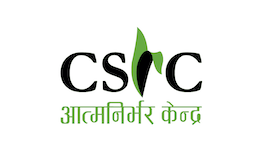Climate Resilience Initiative for landless and smallholder communities across Nepal (CRI)
Project Name: Climate Resilience Initiative for landless and smallholder communities across Nepal (CRI)
Working Area: Sindhupalchowk: Panchpokhari Thangpal Rural Municipality (7 communities of Ward no. 1 & 2), Mahottari: Gaushala Municipality (6 communities of Ward no. 10 & 12)
Project Partner: World Jewish Relief (WJR)
Project Duration: 1st May 2023 to 30th April 2026
Project Budget: NPR 71,733,807/-
The CSRC, in collaboration with WJR, is implementing a climate resilience initiative in Nepal to support landless and marginalized farmers affected by climate change. This program focuses on sustainable land use planning, climate change adaptation, and resilience practices. It aims to educate local communities on climate change, preserve indigenous seeds and knowledge, and promote climate-resilient agricultural practices. The initiative also supports disaster mitigation, income generation, and community development through participatory planning and capacity building, ultimately benefiting vulnerable populations, landless and smallholder farmers.
Project Objective/s
Increase livelihood resilience of 12 communities of landless and smallholder farmers.
Major Outcomes:
Outcome 1: Participants have livelihoods that are adapted to the changing climate conditions and produce sufficient food and income.
Outcome 2: Livelihoods are less exposed to droughts, floods and landslides.
Outcome 3: Local governments (Panchpokhari (Sindupalchowk) and Gaushala (Mahottari) municipality governments) are supporting people with land ownership and sustainable land use.
Project Summary
Community Self-Reliance Centre (CSRC), with the support of World Jewish Relief (WJR), is implementing the Climate Resilient Land-Agriculture Program (CRI) in Gaushala Municipality of Mahottari district and Panchpokhari Thangpal Rural Municipality of Sindhupalchok district from June 2023. It is a three-year program.
The community names in the two districts are Nayabasti, Laxminia, Purao Kantibazar, Thapatole, Musharitole, Chamartole in Mahotari/ Salme, Dale, Bolgau, Newartole, Mandigau, Barjetole in Sindhupalchok.
CSRC has continuously empowered communities to adapt to climate change and build resilience in their agricultural practices. Furtalso,ore, it has been supporting the communities, not only to generate income through climate-resilient agricultural practices but also sustainable livelihood utilizing fallow land and riverbed areas.
The program, CRI, has prioritized women, who are often more vulnerable to climate change. It recognizes the value of traditional agricultural practices in building resilience and encouraging the use of techniques like intercropping, preserving native seeds, the use of biofertilizers, biopesticides, and collaborative farming efforts.
To achieve these goals, the program has been continuously conducting several training sessions such as Climate Resilient Agricultural Technology, Tea farming, Perennial fruit farming, Micro Enterprises and Business Development plans, Commercial Vegetable Farming, etc. applicable to program-implemented regions. Moreover, for the program’s effectiveness and sustainable livelihood, CSRC has been continuously strengthening District Land Rights Forums (DLRF), farmer’s organizations, and raising awareness among community people.

